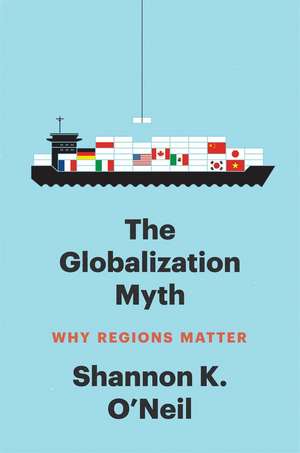The Globalization Myth: Why Regions Matter: Council on Foreign Relations Books
Autor Shannon K O'Neilen Limba Engleză Paperback – 17 oct 2023
The conventional wisdom about globalization is wrong. Over the past forty years as companies, money, ideas, and people went abroad, they increasingly looked regionally rather than globally. O’Neil details this transformation and the rise of three major regional hubs in Asia, Europe, and North America. Current technological, demographic, and geopolitical trends look only to deepen these regional ties. O’Neil argues that this has urgent implications for the United States. Regionalization has enhanced economic competitiveness and prosperity in Europe and Asia. It could do the same for the United States, if only it would embrace its neighbors.
Preț: 101.26 lei
Nou
Puncte Express: 152
Preț estimativ în valută:
19.38€ • 20.11$ • 16.20£
19.38€ • 20.11$ • 16.20£
Carte disponibilă
Livrare economică 24 februarie-10 martie
Livrare express 08-14 februarie pentru 22.22 lei
Preluare comenzi: 021 569.72.76
Specificații
ISBN-13: 9780300274110
ISBN-10: 0300274114
Pagini: 240
Ilustrații: 7 b-w illus.
Dimensiuni: 156 x 235 x 16 mm
Greutate: 0.32 kg
Editura: Yale University Press
Colecția Yale University Press
Seria Council on Foreign Relations Books
ISBN-10: 0300274114
Pagini: 240
Ilustrații: 7 b-w illus.
Dimensiuni: 156 x 235 x 16 mm
Greutate: 0.32 kg
Editura: Yale University Press
Colecția Yale University Press
Seria Council on Foreign Relations Books
Recenzii
“It is regionalisation, not globalisation, that explains the mechanics of prosperity. . . . If hope truly does lie in thought, we need to take our thinking about the world a lot more seriously than we do today.”—Richard Horton, The Lancet
“[A] lively narrative. . . . Recommended.”—J. Gerber, Choice
“Regionalization is quickly becoming the new globalization. Shannon O’Neil’s The Globalization Myth deftly explains why the key to America’s continued industrial competitiveness lies neither in ‘America alone’ reshoring nor in laissez faire offshoring, but in nearshoring. An important corrective to a broken public policy debate.”—Ian Bremmer, president, Eurasia Group
“Shannon O’Neil’s call for ‘more NAFTAs and fewer America Firsts’ is timely, constructive, and pragmatic. With her deep knowledge of the Americas and of the politics of regional integration, she makes a practical case for an American economic strategy which would work in a world dividing more into blocs. I urge our elected officials to open their minds to O’Neil’s compelling argument.”—Adam S. Posen, president, Peterson Institute for International Economics
“This is a phenomenal book about regionalization. Global markets are consolidating into three regional hubs. The US needs to act on that, or it will get left behind. I found this a gripping read!”—Ann E. Harrison, University of California, Berkeley
“[A] lively narrative. . . . Recommended.”—J. Gerber, Choice
“Regionalization is quickly becoming the new globalization. Shannon O’Neil’s The Globalization Myth deftly explains why the key to America’s continued industrial competitiveness lies neither in ‘America alone’ reshoring nor in laissez faire offshoring, but in nearshoring. An important corrective to a broken public policy debate.”—Ian Bremmer, president, Eurasia Group
“Shannon O’Neil’s call for ‘more NAFTAs and fewer America Firsts’ is timely, constructive, and pragmatic. With her deep knowledge of the Americas and of the politics of regional integration, she makes a practical case for an American economic strategy which would work in a world dividing more into blocs. I urge our elected officials to open their minds to O’Neil’s compelling argument.”—Adam S. Posen, president, Peterson Institute for International Economics
“This is a phenomenal book about regionalization. Global markets are consolidating into three regional hubs. The US needs to act on that, or it will get left behind. I found this a gripping read!”—Ann E. Harrison, University of California, Berkeley
Notă biografică
Shannon K. O’Neil is the vice president of studies and Nelson and David Rockefeller Senior Fellow for Latin American Studies at the Council on Foreign Relations.
Descriere
A case for why regionalization, not globalization, has been the biggest economic trend of the past forty years




